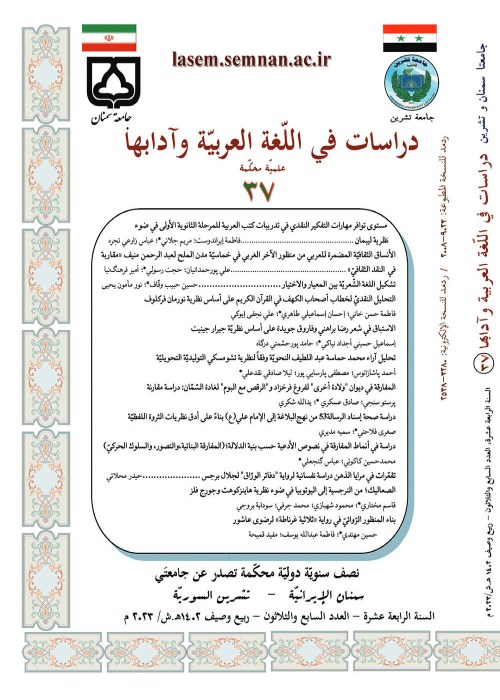Pioneering Role of Sayyid Jamāl ad-Dīn Asadābādī in Rise of Egyptian Resistance Literature (Case Study of Mahmoud Sami el-Baroudi’s Diwan)
Sayyid Jamāl ad-Dīn Asadābādī played a major pioneering role in Islamic uprising and guiding the activities of writers at the end of nineteenth century and the beginning of twentieth century. He dedicated his utmost effort to revive Islamic thought, laying the foundations for unity among all Muslims, attracting energies to resist major colonial powers and calling for adherence of Islamic countries to common principles of Islam. Among the Islamic countries, Egypt was selected by Sayyid Jamāl ad-Dīn Asadābādī as an epicenter for his political activities because of its high standing and status as well as a source of Islamic currents after remarkable political, social and literary developments took place in this country. In the literary field, writers and scholars such as Mahmoud Sami El-Baroudi and Muhammad Abduh studied under his auspices as pioneering figures, the former for modern Arabic poetry and the latter as the father of modern Arabic prose. Sami El-Baroudi developed features in modern Arabic poetry, from which we can discern the characteristics of resistance and steadfastness, which were inspired by Sayyid Jamāl ad-Dīn Asadābādī’s reformist project. Thus, the poet emerged as an Islamic fighter challenging colonialism and its lackeys in the real world, so that he was nicknamed “Lord of Sword and Pen” because of giving pulse and freshness to modern Arabic poetry as well as his mastery of martial arts. This study intended to shed light on the extent of Sayyid Jamāl ad-Dīn Asadābādī’s impact on modern poetry and literature using El-Baroudi''''s poetry as the research subject. This research was conducted using a descriptive-analytical method and yielded the following results. The recovery and transition of modern Arabic poetry from stagnation, emotionlessness and superficiality to strength, vitality and subjectivity is not dependent only on French influence and thereby its contact with the features of European literature but rather indebted to the attempts of Islamic leaders and thinkers such as Sayyid Jamāl ad-Dīn Asadābādī and his followers in various Islamic countries from the river to the sea. Sayyid Jamāl ad-Dīn Asadābādī’s call focused on two important elements, namely preservation of Islamic authenticity and modernity. The features of this pioneering role are represented in Mahmoud Sami El-Baroudi’s poetry, including defending oppressed peoples, urging them to acquire modern sciences and to avoid idleness and humiliation, unveiling the real face of colonizers and their conspiracies, and inviting Muslim rulers to establish justice, confirming the impact of scholars and intellectuals in determining the fate of Islamic community under the influence of Sayyid Jamāl ad-Dīn Asadābādī’s thoughts.
- حق عضویت دریافتی صرف حمایت از نشریات عضو و نگهداری، تکمیل و توسعه مگیران میشود.
- پرداخت حق اشتراک و دانلود مقالات اجازه بازنشر آن در سایر رسانههای چاپی و دیجیتال را به کاربر نمیدهد.


